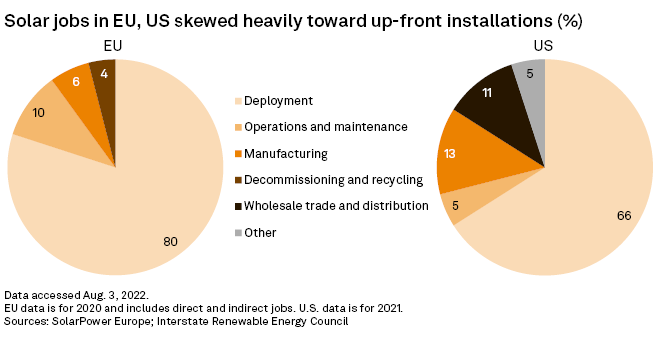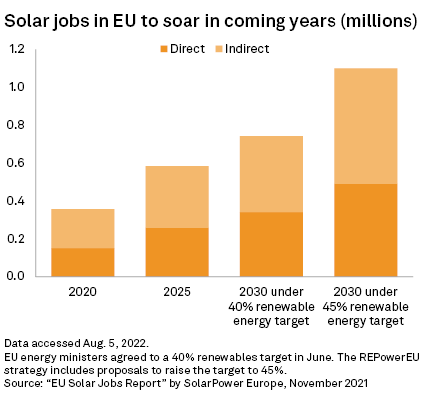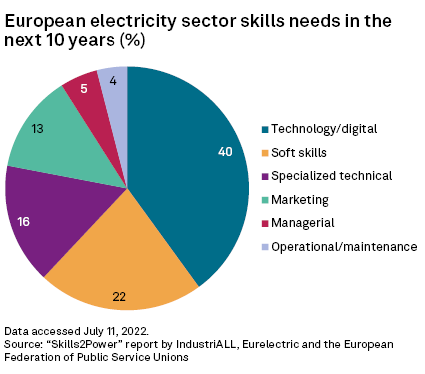Featured Topics
Featured Products
Events
S&P Global Offerings
Featured Topics
Featured Products
Events
S&P Global Offerings
Featured Topics
Featured Products
Events
S&P Global Offerings
Featured Topics
Featured Products
Events
Financial and Market intelligence
Fundamental & Alternative Datasets
Government & Defense
Professional Services
Banking & Capital Markets
Economy & Finance
Energy Transition & Sustainability
Technology & Innovation
Podcasts & Newsletters
Financial and Market intelligence
Fundamental & Alternative Datasets
Government & Defense
Professional Services
Banking & Capital Markets
Economy & Finance
Energy Transition & Sustainability
Technology & Innovation
Podcasts & Newsletters
12 Sep, 2022

| Clean energy workers will be in high demand as the U.S. and EU race to build the wind and solar projects the energy transition will require. |
As renewable energy targets swell across the world, the availability of skilled workers risks becoming a bottleneck for deployment.
|
In the EU, 650,000 people work in wind and solar energy. This figure is set to double in the next eight years, according to trade associations SolarPower Europe and WindEurope.
The U.S. is seeing a similar growth pattern, with the country's new Inflation Reduction Act expected to generate nearly 1 million additional clean energy jobs each year in the coming decade.
But hiring fresh talent is already proving difficult: 89% of solar companies surveyed for the National Solar Jobs Census by the U.S. Interstate Renewable Energy Council, or IREC, reported difficulties finding qualified applicants last year, citing competition, a small applicant pool, and a lack of training, experience and technical skills.
"If you look at the projections going forward, we can see that the demand is huge and we will probably struggle on the supply in the long run if we don't put in place specific plans for how to close this gap," said Kerstin Knapp, executive vice president for people and culture at wind giant Vestas Wind Systems A/S.
"It is really an underestimated element of the energy transition," Knapp said in an interview.
'Bottleneck' on the front line
For solar and wind, most workers are involved in the installation of panels and turbines, meaning they work through a pipeline of projects and move on every few months, often to different countries. Experts said that workforces will soon struggle to keep up as installations targets grow.
These frontline workers make up 60% of Vestas' head count. "That is already today a bottleneck but will become even more so in the future," Knapp said. Safety experts, construction managers and cybersecurity professionals are already hard to recruit, the executive added.
The skills shortage could hamper the world's ability to achieve net-zero emissions, according to Antonio Scala, head of people and organization for Italian utility Enel SpA's renewables, thermal generation, infrastructure and networks divisions.
"In the immediate future, we will mainly be hiring from utilities and the industrial sector because the transfer of skills from traditional sectors to renewable energy is more direct," Scala said in an email. To meet longer-term staffing needs, "the world needs a skills and training revolution."

The wind industry will start seeing a skills shortfall from 2025, according to Tom Hopkinson, CEO of renewables recruitment agency Taylor Hopkinson Ltd., which fills roles and provides freelance staff for major utilities and developers including Vattenfall AB, Equinor ASA, and Ocean Winds SL, the joint venture between Engie SA and EDP Renováveis SA.
Taylor Hopkinson has recently declined assignments amid a demand surge that is especially pronounced for skilled middle-management project engineers, Hopkinson said in an interview.
As demand grows, the offshore wind sector in particular is likely to run into difficulties. Europe, already the world leader in offshore wind, wants to build hundreds of gigawatts by midcentury. Meanwhile, the nascent U.S. market is rapidly ramping up. It usually takes more than 10 years to become a competent project leader for offshore wind farms, and skills gaps in this area will not be plugged in the next few years, Hopkinson said.

Episodes of Energy Evolution are available on iTunes , Spotify and other podcast platforms.

"What you will see is some very inexperienced people leading some very big projects," the recruiter added. Aside from health and safety concerns, this will also raise the cost of project financing as banks price in the higher risk of delivery delays.
 |
BayWa r.e. AG, a global developer of onshore wind and solar projects, has seen additional vacancies grow 25% each quarter since 2020, Stefan Hobmair, head of people development and strategic recruitment, said in an interview. While key roles such as software developers and project engineers are hard to come by across all sectors, staffing projects is not yet an issue, the executive said. BayWa r.e. has developed an in-house training program for wind- and solar-specific skills, Hobmair said.
'Grand opportunity' to retrain
In the growing renewables industry, developers will have to increase their head count by hiring from other sectors, according to Louise Christensen, BayWa r.e.'s global employer branding manager.
"We're not dead [set] against people who have no experience in our industry," Christensen said in an interview. "Of course, we need to train them so that they are able to do their job, but often they come with different sets of ideas that we haven't had before."
In the U.S., much of the potential for renewables deployment is in areas where fossil fuel industries are fading and workers with compatible skills are becoming available, such as sun-rich Texas and windy North Dakota, according to the Brookings Institution. "The clean energy transition offers a grand opportunity to retrain local workers and repurpose the industrial infrastructure in these communities," analysts at the think tank said in a February 2021 report.
There are exceptions to this overlap, however. Energy workers in regions without clean energy booms, such as parts of Kentucky, Minnesota and West Virginia, will require more targeted assistance to find new careers and transfer their skills, the analysts said
To address these issues, Sen. Tammy Baldwin, D-Wis., and several other Democrats introduced the American Energy Worker Opportunity Act in July 2021, focusing on supporting and upskilling coal miners. While welcomed by workers' unions, the bill has yet to advance in the Senate.
Many coal miners, being electricians or skilled equipment operators, have skills that overlap with clean power careers, said Brandon Dennison, CEO and founder of workforce development organization Coalfield Development. Retraining policies in Appalachia, though, often miss key points, Dennison said.
 |
"If you want to trigger eye rolls and frustration in a coal community meeting, just saying something like, 'It's OK, the government is going to help retrain you.' We've been told this a thousand times, and it just keeps not working out," Dennison said. One obstacle is a lack of pay during training. "They can't put their lives on hold and stop paying bills while they get retrained."
In Europe, some workers' groups see insufficient political will for reskilling. "In our view, this is the Achilles' heel of the just transition," said Judith Kirton-Darling, secretary-general of IndustriALL, the European trade union representing energy workers.
"How you upskill or reskill hundreds of thousands of people: that isn't given as much political attention as some of the other questions of the energy transition, such as technology and permitting," Kirton-Darling said.
IndustriALL oversees reskilling programs in areas where fossil fuel jobs are now fading, such as eastern Germany and some of Spain's coal regions, which are now looking to build green hydrogen industries. While there has been success in many of these initiatives, a skills mismatch often prevails.
"In Spain, the concern was that the skills needed for green hydrogen projects are far higher than the skills of the workers that have left the old industries," Kirton-Darling said.
Educating a new workforce
Renewable energy developers are not alone in their quest for new talent. Former shipyard workers in northern Germany, who have many relevant skills for the offshore wind sector, are instead attracted by new gigafactories, such as Tesla Inc.'s facility near Berlin, according to Kirton-Darling.
 |
"Everybody is pinching everybody's workers at the moment," the union leader said. "There is enormous competition for engineers and skilled workers."
Ultimately, there is only so much that companies can do with regard to training and reskilling. "Governments embracing the energy transition will require holistic thinking to educate many people in line with the new needs and requirements," said Vestas' Knapp, adding that ministries for energy, labor and education should collaborate on such policies.
IndustriALL has developed the Skills2Power plan with Eurelectric, a lobby group for Europe's utility sector, laying out recommendations for training people in the skills needed by clean energy companies. Its proposals include adapting education curricula to anticipate future skills and introducing systematic strategies to boost the attractiveness of power sector jobs.
When it comes to earlier education in schools, companies and politicians should work together to ensure children are given perspectives on green industries and on jobs that may not even exist yet, according to BayWa r.e.'s Christensen. Enel is also collaborating with schools — for instance in Latin America and its U.S. hubs including Oklahoma, Texas and North Dakota — focusing on science and math skills that may lay the foundation for a career in renewables.
"This must be a joint effort so that we can work with future generations," Christensen said.
S&P Global Commodity Insights produces content for distribution on S&P Capital IQ Pro.
